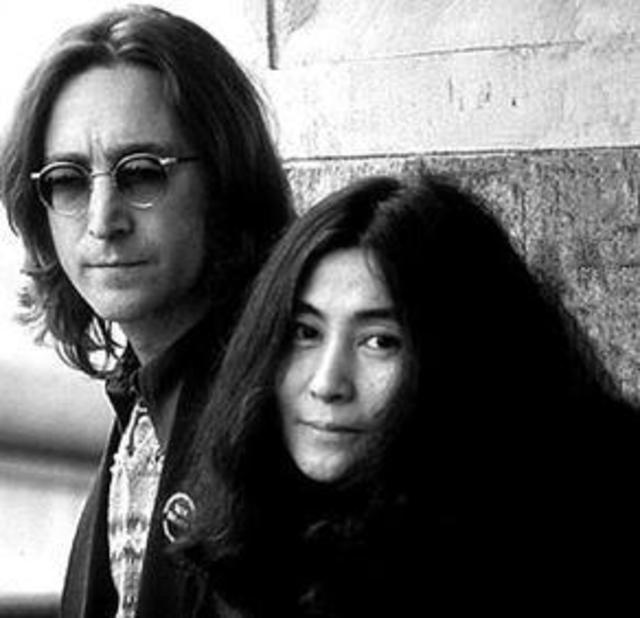John Lennon

Inductee: John Lennon (vocals, guitar; born October 9, 1940, died December 8, 1980)John Lennon didn't invent rock and roll, nor did he embody it as toweringly as figures like Elvis Presley and Little Richard, but he did more than anyone else to shake it up, move it forward and instill it with a conscience. As the most daring and outspoken of the four Beatles, he helped shape the agenda of the Sixties - socially and politically, no less than musically. As a solo artist, he made music that alternately disturbed and soothed, provoked and sought community. As a human being, he served as an exemplar of honesty in his art and life. As Jann Wenner wrote in the foreword to a collection of writings entitled The Ballad of John and Yoko, "Of the many things that will be long remembered about John Lennon - his genius as a musician and singer, his wit and literary swiftness, his social intuition and leadership - among the most haunting was the stark, unembarrassed commitment of his life, his work and his undernourished frame to truth, to peace and to humanity."Lennon was born in 1940 during the Nazi bombing of Britain and given the middle name Winston, after prime minister Churchill (he would later change his middle name to Ono). At age five, Lennon was sent to live with his "Aunt Mimi" after his parents separated. In 1956, Aunt Mimi bought Lennon a guitar. His incessant playing prompted her to remark, "The guitar's all very well as a hobby, John, but you'll never make a living out of it." That same year, Lennon formed his first group, the Quarrymen, which evolved into the Beatles.Having experienced the horror of a world at war as a child and then living through the Vietnam era as a young man, Lennon came to embrace and embody pacifism. His was the voice and vision that powered such Beatles classics as "All You Need Is Love" and "Strawberry Fields Forever." Yet Lennon also had a dark side that found expression in pained outcries dating as far back as "Help," and his was the most naturally adventuresome musical spirit in the band, as evidenced by such outre tracks as "I Am the Walrus" and "Being for the Benefit of Mr. Kite." The uncensored, self-lacerating aspect of the Lennon persona reached a fevered pitch with the drug-withdrawal blues of "Cold Turkey," a 1969 single released under the name Plastic Ono Band.Although Lennon was a complicated man, he chose after the Beatles to simplify his art in order to figure out his life, erasing the boundaries between the two. As he explained it, he started trying "to shave off all imagery, pretensions of poetry, illusions of grandeur...Just say what it is, simple English, make it rhyme and put a backbeat on it, and express yourself as simply [and] straightforwardly as possible." His most fully realized statement as a solo artist was 1970's John Lennon/Plastic Ono Band. It followed several collaborative sound collages recorded toward the end of the Beatles era with Yoko Ono, his wife and collaborator. The raw, confessional nature of Plastic Ono Band reflected the primal-scream therapy that Lennon and Ono had been undergoing with psychologist Arthur Janov. He dealt with such fundamental issues as "God" and "Mother" and the class system ("Working Class Hero") on an album as full of naked candor as any in rock has ever been.Many of Lennon's post-Beatles compositions – "Imagine," "Mind Games" and "Instant Karma" – have rightfully become anthems, flaunting tough-minded realism, cosmic epiphany, hard-won idealism and visionary utopianism in equal measure. For all of the unvarnished genius of Lennon's recordings, however, much of what lingers in the public memory goes beyond musical legacy. Rather, it has to do with leading by example. The relationship between John and Yoko endured challenges to became one of the most touching and celebrated of 20th-century romances. They were gallantly foolish in undertaking performance art pieces - bed-ins, happenings, full-page ads declaring "War Is Over!" - that spread their message of peace.During the early Seventies, Lennon fought the U.S. government to avoid deportation – a campaign of harassment by Nixon-era conservatives that officially ended when Lennon was issued a green card in 1976 – and came to love his adopted city of New York. In 1974, Lennon had his first Number One single with the release of "Whatever Gets You Thru the Night" (Walls and Bridges, 1974), which featured Elton John on backing vocals, piano and organ. On November 28, 1974, Elton John cajoled Lennon into joining him onstage at Madison Square Garden, where they performed "Whatever Gets You Thru the Night," "Lucy in the Sky with Diamonds" and "I Saw Her Standing There." It would be Lennon's last public performance.Beginning with the birth of his second son, Sean Ono Lennon, in 1975, John Lennon dropped out of sight for five years. During this spell, he chose to lay low and raise Sean as a proud househusband. Simply by stepping back and "watching the wheels," John Lennon made a statement about priorities that said more than words and music. His eventual return to the recording scene in 1980 was one of the more eagerly anticipated musical events of the year. The album Double Fantasy, jointly credited to John Lennon and Yoko Ono and named for a flower he'd seen at a botanical garden, was released on November 17, 1980. On December 8, a brilliant life came to an untimely end when Lennon was shot to death outside his New York City apartment. He was returning from a recording session for an album that was posthumously released as Milk and Honey. Three weeks after his death, with the entire rock world still in disbelief and mourning, "(Just Like) Starting Over" (from Double Fantasy) hit #1.